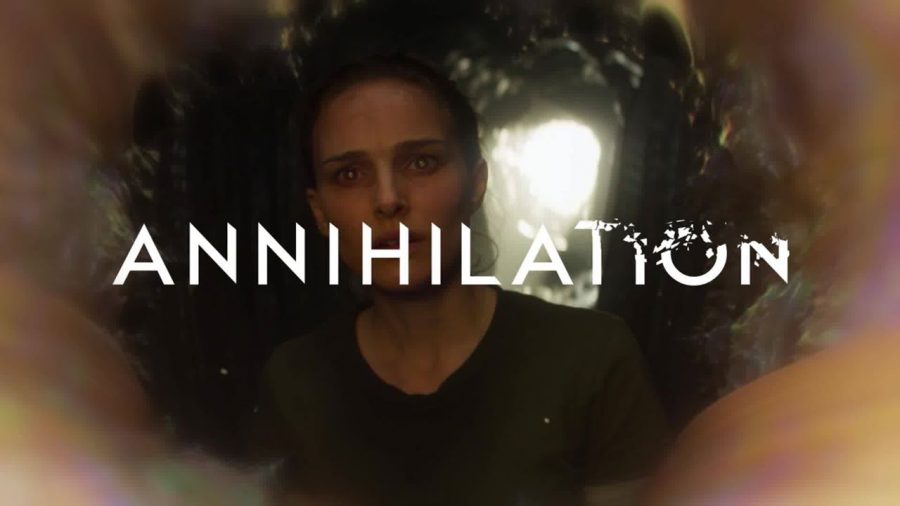Some movies spoon-feed their plot to the audience, keep interpretations unambiguous and exist mainly to offer a temporary stimulating experience. Alex Garland’s “Annihilation” falls on the complete opposite end of the spectrum; the experience continues long after the act of viewing. Honestly, there may be something perpetually unsatisfying about that.
Garland is a seasoned science fiction storyteller who has deeply explored the boundaries of the genre. He has proven his range as a screenplay writer, having delivered a portfolio that includes both an effective zombie thriller (“28 Weeks Later”) and a beautiful love story set in a tragic future (“Never Let Me Go”). “Annihilation” is Garland’s second film as a director, following the low-budget – but visually touching hit – “Ex Machina” in 2014. His quality experience with the genre expertly presents itself in his latest movie.
“Annihilation” follows Lena, a “soldier-scientist” with a concentration in cellular biology, played by Natalie Portman. When she learns about a mysterious military operation involving her husband (Oscar Isaac), Lena is pulled into the same complicated circumstances. An enigmatic field of energy, called the Shimmer, slowly expands across a region of land; no one who enters the Shimmer has returned. Lena joins with a lonely psychologist (Jennifer Jason Leigh), an introspective physicist (Tessa Thompson), a bereaved geologist (Tuva Novotny) and a tough paramedic (Gina Rodriguez), to form the latest team to make the expedition.
If the plot sounds complex and confusing, that’s because “Annihilation” truly is a high-concept film. The mystery of the Shimmer proposes a multitude of questions, with the most obvious one being “what is really going on here?” Because “Annihilation” feels very much like a movie that is building towards something, curiosity becomes the highest virtue for the audience member. The good news is that the science fiction aspects tastes fresh and the forces at work are thoroughly interesting. But the answers are coded. If you want to transact with the concept, expect an undertaking and perhaps more than one viewing.
Natalie Portman’s performance is critical to animating the nuance of “Annihilation;” her full commitment to the script is seriously palatable. Portman plays her character with a balance between emotion and intelligence, her thoughtful engagement with the obscurity of her situation setting an example for the audience, especially at the film’s end. Although, on the whole, the other characters, with the exception of the husband played by Isaac, are less interesting than Portman’s Lena, the acting across the board is still more than successful, as all of the actors demonstrated an intellectual understanding of the story. Additionally, I would have liked Tessa Thompson to be given a greater voice, but, like other elements of this movie, there remains a lot of beauty in what is not said explicitly.
In addition to what is left to be discovered in the concept and performances, the style of “Annihilation” also has layers. The Shimmer is an enchanting idea, not just abstractly but also visually; you may find yourself peacefully lost in observing the behavior of its psychedelic outer walls. As the characters travel further into the mystery, new settings and colors appear in proportion. Moreover, Alex Garland frames his film brilliantly, making for a number of memorable shots, including one noteworthy scene which was filmed through a water glass to create a refractory effect that alludes to the larger themes of the movie. “Annihilation” fulfills as a spectacle alone.
The cinematic beauty of “Annihilation” is possible because Garland really takes his time with each scene. The movie often moves slowly, but usually with a purpose. Moments are drawn out to capture every detail. However, this can make the story feel wanting. While there is no lack of excitement, surprisingly little happens in the grand scheme. “Annihilation” deliberately holds itself back to keep the concept open-ended, but a better story might include more particulars about the characters and their personal experiences. Still, “Annihilation” contains a story worth telling, albeit one that mainly serves as a vehicle to larger themes.
At its heart, “Annihilation” is about discovery. Needless to say, discovery is built into any adventure story, and this movie follows the theme all the way to its core. Discoveries seem to come in two forms: the observation of what already exists and the creation of what has not existed before. “Annihilation” masterfully examines both meanings. In doing so, the movie sets its viewers on their own path to discovery. At this point, I cannot be certain that satisfaction or resolve lie at the end of my journey or yours, but regardless, “Annihilation” prompts thoughts that are worth following in the meantime.
Dillon MacInnis can be reached at [email protected].



















